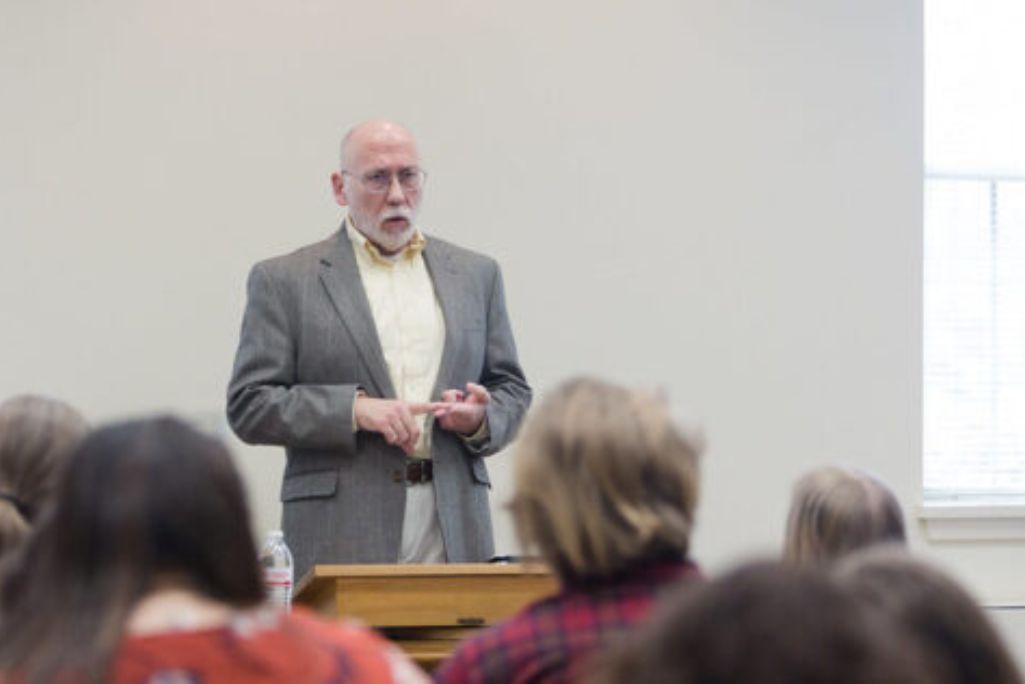
Keith Harper teaches a class at Southeastern Baptist Theological Seminary.
Dr. Keith Harper entered into the presence of his King and Savior on April 23, 2025, following a ten-month battle with cancer. During his long ministry as a professor, he distinguished himself as a respected historian, devoted mentor, dear friend and faithful servant of our Lord Jesus Christ. His passing leaves a noticeable absence in the lives of those who knew him — a quiet that settles deep, missing the vibrant voice of a teacher, mentor, colleague and friend. His was a voice full of encouragement, insight, curiosity and no shortage of dry humor and timely sarcasm.
Dr. Harper is best known as a Baptist historian. After earning his Ph.D. in American history from the University of Kentucky, where he focused on Southern history, he began what would become a lifelong pursuit: exploring the intersection of faith, culture and history with clarity, charity and conviction. His dissertation, later published as “The Quality of Mercy: Southern Baptists and Social Christianity, 1890-1920,” marked the beginning of a journey that never lost its pastoral concern for Christ’s Church.
Following a brief tenure at Mississippi College, Dr. Harper joined the faculty of Southeastern Baptist Theological Seminary in 1996 and retired in 2024. He shaped generations of students — not just by what he taught, but by who he was. He modeled what it means to steward knowledge for the sake of the Church. Though his title was Senior Professor of Baptist Studies, his influence extended far beyond what any title can capture.
His contributions to Baptist scholarship are both deep and wide. In addition to his published dissertation, he authored or edited essential texts including:
- “SBC FAQs: A Ready Reference” (with Amy Whitfield)
- “Rescue the Perishing: Selected Letters from Annie Armstrong and Other Writings”
- “Send the Light: Lottie Moon’s Letters and Other Writings”
- “American Denominational History”
- “Through a Glass Darkly: Changing Perceptions of Baptist Identity”
- “Between Fetters and Freedom: African American Baptists Since Emancipation”
- “A Mere Kentucky of a Place: The Elkhorn Association and Kentucky’s First Baptists”
He also served as series editor for “America’s Baptists” with the University of Tennessee Press, curating voices that continue to shape how we understand and engage our Baptist identity.
Dr. Harper’s impact extended far beyond his scholarship. Whether at ETS, in committee meetings at Southeastern, or walking the halls of the SBC annual meeting, he brought both wisdom and levity. His insight often disarmed, occasionally challenged, but always edified. And he could deliver it all with a grin and a zinger that left you laughing — and thinking.
Yet for all his accomplishments in print, it’s his investment in people that defines his legacy. He mentored widely — often informally, always intentionally. Ask anyone who studied under him or walked the halls alongside him, and they’ll tell you: he saw potential in others before they saw it in themselves. He believed in his students. He believed in scholarship. He wanted students to believe that scholarship mattered for faithful ministry.
Dr. Harper had a generous spirit, so he was always a quiet champion of those often overlooked. He mentored younger faculty colleagues who were still finding their footing, most of whom were not historians. He invested in women who were pursuing a theological education and navigating academia. He encouraged scholars with whom he disagreed, but whom he nevertheless respected. He advocated not with fanfare, but with steady conviction and constant support.
His “office hours” were as likely to take place in the library or hallway as they were in his office. There, he offered encouragement, stories from Baptist history, well-timed sarcasm and the occasional not-so-gentle nudge to finish the dissertation or apply for that degree. He cared about your work because he cared about your calling.
As a dear friend once said — and we agree — Keith Harper was our favorite curmudgeon: witty, wise and wonderfully warm beneath that dry sense of humor. He was a craftsman of Baptist history and a shepherd of human souls. He reminded us that the past isn’t just about dusty records — it’s about faith, sacrifice and the conviction of those who came before. And he reminded us that our work isn’t just academic — it’s ecclesial. It’s discipleship. It’s a service to Christ and His church.
What drove all of this was his belief in the gospel and its power to transform. That’s what he most wanted — for people to be conformed to the image of Christ and to walk faithfully in the callings God has given them. He understood that history is complicated, and it deserves to be represented truthfully, even when believers have fallen short. But he also believed the gospel reminds us of the way things ought to be — and, by God’s grace, one day will be. He was a historian who longed for a better future — for his students, for his friends, for the church and even for the Southern Baptist Convention (SBC). He looked back in order to help us move forward — with courage, with conviction and with hope.
Dr. Harper, thank you. For your scholarship. Your wit. Your friendship. Your faith. You have fought the good fight. You have finished the race. You have kept the faith. We will miss your voice, your laughter, your questions, your stories. But we look forward to that day when we meet again, in the new creation — perhaps with coffee in hand and a story about the SBC on your lips.
(EDITOR’S NOTE — Nathan Finn is teaching pastor at Taylors First Baptist Church in Taylors, S.C., and recording secretary of the Southern Baptist Convention. Keith Whitfield is senior pastor of Temple Church in New Bern, N.C.)


